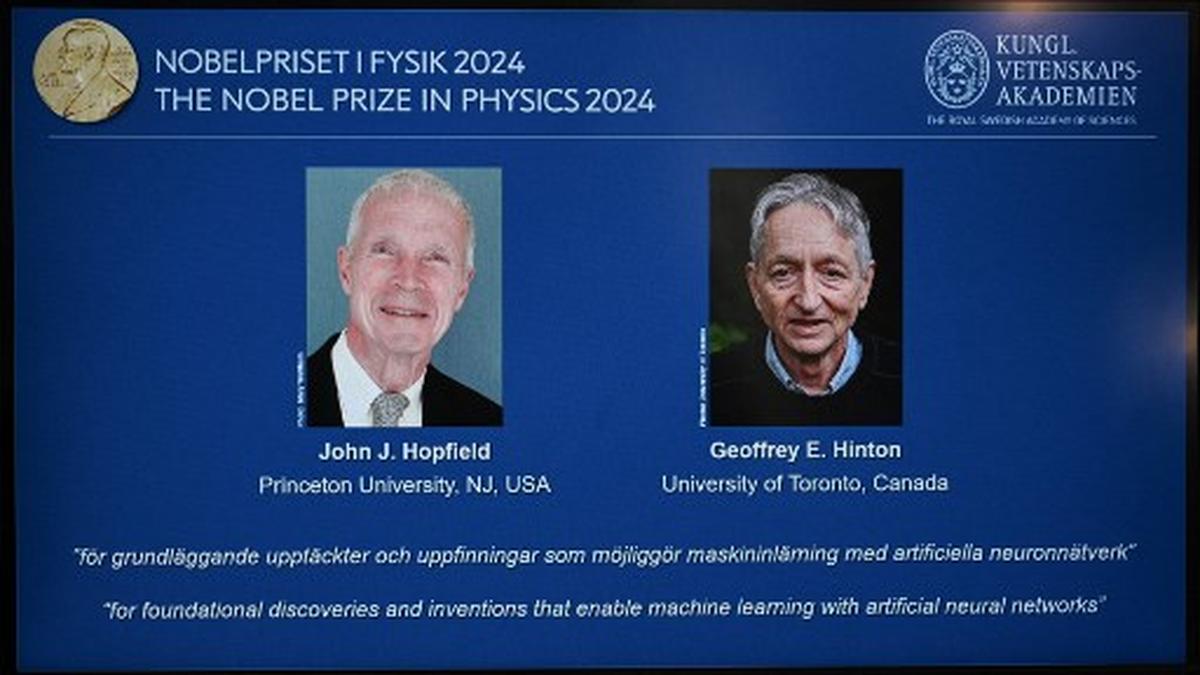The Royal Swedish Academy of Sciences has awarded the 2024 Nobel Prize in Physics to John J. Hopfield and Geoffrey E. Hinton for their groundbreaking contributions to machine learning and artificial neural networks. This prestigious recognition highlights the profound impact of their work on modern technology and scientific research.
Revolutionizing Artificial Intelligence
Hopfield and Hinton’s research has laid the foundation for today’s powerful machine learning algorithms, which have applications across various fields, from facial recognition to language translation. Their innovative approaches, rooted in physics principles, have transformed the landscape of artificial intelligence.
John Hopfield’s Associative Memory Network
John Hopfield, a professor at Princeton University, developed an associative memory network that can store and reconstruct images and other patterns in data. His invention, known as the Hopfield network, uses concepts from physics, particularly atomic spin, to represent and store data efficiently.The Hopfield network functions by adjusting its values to match input data, enabling it to reconstruct incomplete images and find patterns within noisy information. This breakthrough has had far-reaching implications for data processing and pattern recognition.
Geoffrey Hinton’s Boltzmann Machine
Geoffrey Hinton, a professor at the University of Toronto, expanded upon Hopfield’s ideas with the creation of the Boltzmann machine. This advanced model utilizes principles from statistical physics, allowing the network to autonomously learn and identify distinct elements within data.The Boltzmann machine is not only capable of classifying images but also generating new data that matches learned patterns. This innovation has proven foundational in image recognition and numerous other AI applications.
Impact on Science and Technology
The work of Hopfield and Hinton has had a profound impact on various scientific disciplines:
- Physics: Artificial neural networks are now used extensively in particle physics, material science, and astrophysics.
- Medicine: Machine learning algorithms assist in medical imaging analysis and disease diagnosis.
- Computer Science: Their research forms the basis of deep learning and modern AI systems.
- Engineering: Neural networks are employed in developing new materials with specific properties.
Applications in Daily Life
The discoveries of Hopfield and Hinton have become integral to many aspects of our daily lives:
- Facial Recognition: Used in security systems and smartphone unlocking features.
- Language Translation: Powering real-time translation services and language learning apps.
- Voice Assistants: Enabling natural language processing in devices like Siri and Alexa.
- Recommendation Systems: Driving personalized content suggestions on streaming platforms and e-commerce sites.
The Nobel Prize Ceremony
The Nobel Prize in Physics, which comes with a cash award of 11 million Swedish kronor (approximately $1 million USD), will be shared equally between Hopfield and Hinton. The laureates will receive their awards at a ceremony in Stockholm on December 10, the anniversary of Alfred Nobel’s death.
Reactions from the Scientific Community
The announcement has been met with widespread acclaim from the scientific community. Colleagues and peers have praised the selection, noting the transformative nature of Hopfield and Hinton’s work.Ellen Moons, chair of the Nobel Committee for Physics, stated, “The laureates’ work has already been of immense benefit. In physics, we use artificial neural networks in a vast range of areas, such as developing new materials with specific properties.”
Challenges and Ethical Considerations
While celebrating the achievements of Hopfield and Hinton, the Nobel committee also acknowledged the global concerns surrounding machine learning and artificial intelligence. Ellen Moons emphasized, “Collectively, humans carry the responsibility for using this new technology in a safe and ethical way for the greatest benefit of humankind.”Geoffrey Hinton himself has expressed concerns about the potential consequences of AI technology. In a phone interview following the announcement, he stated, “I’m flabbergasted, I had no idea this would happen. I continue to worry about a number of possible bad consequences, particularly the threat of these things getting out of control.”
The Future of Machine Learning
The recognition of Hopfield and Hinton’s work by the Nobel committee underscores the growing importance of machine learning and AI in scientific research and technological innovation. As these fields continue to evolve, their discoveries are likely to play an increasingly crucial role in shaping our future.Experts predict that advancements in machine learning will lead to:
- More sophisticated AI systems capable of complex decision-making
- Breakthroughs in scientific research, particularly in data-intensive fields
- Innovations in healthcare, including personalized medicine and drug discovery
- Advancements in climate modeling and environmental protection
- Improvements in autonomous systems and robotics
Conclusion
The awarding of the 2024 Nobel Prize in Physics to John Hopfield and Geoffrey Hinton marks a significant milestone in the field of artificial intelligence and machine learning. Their pioneering work has not only revolutionized computer science but has also had far-reaching impacts across various scientific disciplines and everyday technologies.As we celebrate their achievements, it’s crucial to consider both the immense potential and the ethical implications of these powerful technologies. The Nobel committee’s decision serves as a reminder of the transformative power of scientific research and the responsibility that comes with such groundbreaking discoveries.The contributions of Hopfield and Hinton have set the stage for continued innovation in AI and machine learning. As these fields continue to evolve, their foundational work will undoubtedly influence future breakthroughs, shaping the way we interact with technology and understand the world around us.The 2024 Nobel Prize in Physics not only honors two exceptional scientists but also highlights the critical role of interdisciplinary research in driving scientific progress. By applying principles from physics to computer science, Hopfield and Hinton have opened up new avenues for exploration and innovation that will continue to benefit humanity for years to come.
